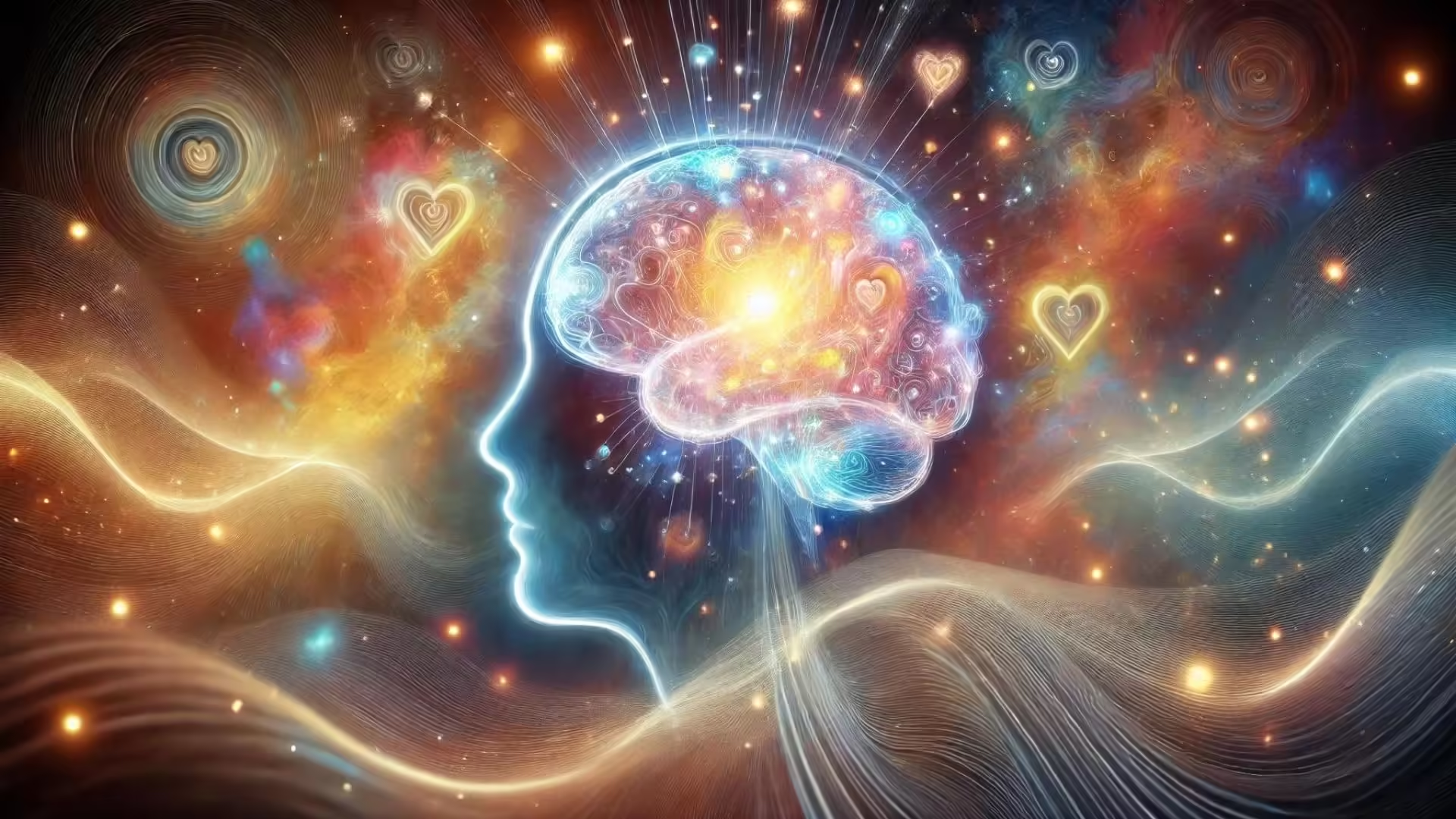Human experiences of love, connection, and spiritual awakenings have long been described as powerful and life-changing. Interestingly, modern neuroscience has shown that these profound experiences share common neural pathways with those activated by drugs and romantic love. Understanding this connection not only provides insight into how the brain functions but also offers a new perspective on the shared nature of some of life’s most transformative events.
The Science Behind Spirituality and the Brain
Recent research in neuroscience has revealed that when people engage in spiritual practices—whether through prayer, meditation, or religious rituals—their brains respond in fascinating ways. Specific areas of the brain, such as the prefrontal cortex, nucleus accumbens, and anterior cingulate cortex, are activated. These regions are typically associated with feelings of reward, pleasure, and emotional regulation.
What’s even more intriguing is that these same brain areas light up during experiences of romantic love or under the influence of certain psychoactive drugs. This overlap suggests that spiritual experiences are deeply tied to the brain’s natural reward systems, creating feelings of euphoria, bliss, and a sense of connection that mirror those of love and drug-induced highs.
The Power of Love in the Brain
Falling in love is often described as euphoric, and now we know why. When people experience romantic love, their brains flood with chemicals like dopamine, oxytocin, and serotonin, which promote bonding, pleasure, and a heightened emotional state. Love can quite literally be intoxicating, triggering the same reward circuits in the brain as addictive substances.
In much the same way, spiritual experiences, whether through deep meditation or intense religious rituals, can evoke a similar brain response. These moments of transcendence stimulate the release of “feel-good” neurotransmitters, reinforcing feelings of connection to a higher power or the universe. In fact, many people describe spiritual experiences as deeply fulfilling, on par with or even surpassing the intensity of romantic love.
The Drug Connection
Substances like opioids, hallucinogens, and stimulants can trigger powerful responses in the brain’s reward system, creating a sense of euphoria. While these substances chemically induce changes, spiritual experiences can naturally activate the same areas. This overlap helps explain why many people who have experienced both drug-induced highs and spiritual awakenings describe similar sensations of transcendence, unity, and overwhelming joy.
However, it’s important to recognize that the brain’s reaction to drugs is artificially stimulated, often leading to addiction and dependency. Spiritual experiences, on the other hand, naturally engage the brain’s pathways in a healthy and beneficial way, leading to lasting feelings of fulfillment and well-being without the harmful consequences of substance use.
The Role of Meditation and Prayer
Meditation, mindfulness, and prayer are powerful tools for activating these brain regions. Studies have shown that regular meditators experience increased activity in the prefrontal cortex, which helps regulate emotions, increase focus, and promote feelings of peace. Similarly, prayer has been found to reduce stress and anxiety, enhancing emotional stability.
In religious or spiritual settings, rituals like chanting, dancing, or even deep breathing can lead to altered states of consciousness, where individuals report a heightened sense of awareness or unity with a higher power. These practices tap into the brain’s natural ability to create feelings of calm, peace, and even ecstasy, much like the effects of love or certain psychoactive drugs.
Why It Matters
Understanding the brain’s role in spiritual experiences, love, and drug-induced euphoria reveals a deeper connection between our mind and body. It also sheds light on why people seek out spiritual practices, fall in love, or, unfortunately, turn to drugs—to feel connected, happy, and fulfilled.
Recognizing that spiritual practices can naturally trigger these powerful feelings may offer alternative paths for individuals seeking fulfillment without the dangers associated with substance abuse. By tapping into meditation, mindfulness, or prayer, people can experience long-term benefits such as improved emotional health, reduced stress, and a stronger sense of purpose.
The Shared Nature of Human Experience
At its core, the fact that love, drugs, and spiritual experiences activate similar parts of the brain speaks to a universal truth about human existence. We are all wired to seek connection, joy, and transcendence. Whether through spiritual practice, relationships, or other healthy pursuits, these shared pathways in the brain highlight the interconnectedness of our emotional and spiritual lives.
By embracing spiritual practices like meditation, mindfulness, or prayer, we can tap into the brain’s natural reward systems, cultivating feelings of love, connection, and joy without turning to harmful substances. Incorporating these practices into daily life could lead to more fulfillment, peace, and emotional well-being.
Expand Your Vocabulary
- Spiritual Experiences:
Spiritual experiences refer to moments where individuals feel a deep connection to something greater than themselves, often tied to religious or existential realizations. In the article, it highlights how these experiences affect the brain. In daily conversations, we might use this term when discussing meditative states or profound realizations, such as “I had a spiritual experience while hiking in nature.” - Neural Pathways:
Neural pathways are the connections in the brain that transmit signals. The article explains how certain experiences, like love or drug use, activate similar neural pathways as spiritual experiences. In everyday life, we might hear this term when discussing brain functions, such as, “Learning a new skill helps create new neural pathways.” - Romantic Love:
Romantic love describes the emotional and passionate connection between individuals. The article shows how the brain reacts similarly to both romantic love and spiritual awakenings. We commonly use this term in contexts related to relationships, such as “Romantic love often sparks feelings of happiness and emotional bonding.” - Transformative:
Something described as transformative has the power to cause a major change. The article talks about how spiritual experiences can be transformative, changing how people think and feel. We can use this word in everyday situations to describe life-changing events, like “Moving to a new city was a transformative experience for me.” - Neuroscience:
Neuroscience is the scientific study of the brain and nervous system. In the article, neuroscience reveals how spiritual experiences activate similar brain regions as love and drugs. We encounter this term when talking about brain research, like “Neuroscience helps us understand how memory works.” - Connection:
Connection refers to a bond or link between two things. The article discusses the connection between spiritual experiences and brain activity. In common usage, connection can describe relationships or emotional bonds, such as “There’s a strong connection between physical health and mental well-being.” - Mind and Soul:
The mind refers to the cognitive processes of thinking, while the soul is often linked to one’s deeper, spiritual essence. In the article, spiritual experiences connect the mind and soul. We often use these terms when reflecting on deeper philosophical or emotional topics, like “Meditation helps me connect my mind and soul.” - Brain Activation:
Brain activation refers to specific areas of the brain becoming more active during certain tasks or experiences. The article explores how love, drugs, and spiritual experiences cause similar brain activation. In everyday conversations, this term might be used in a more scientific context, like “Brain activation increases when we solve complex problems.” - Transformative Experiences:
Transformative experiences are those that fundamentally change one’s perspective or life. In the article, it refers to spiritual experiences that have a significant impact on a person’s thoughts or emotions. People often describe life milestones or significant personal growth as transformative experiences, such as “Traveling abroad was one of the most transformative experiences of my life.” - Shared Nature:
The shared nature of something refers to common characteristics or similarities between seemingly different things. In the article, it refers to the similar brain reactions during love, drug use, and spiritual experiences. In everyday life, this can describe commonalities, such as “The shared nature of laughter brings people together.”
Let’s Talk
- How do you think the brain’s response to spiritual experiences, love, and drug use reveals common aspects of human connection?
- Do you believe that all transformative experiences—whether through love, drugs, or spirituality—are equally impactful on personal growth? Why or why not?
- What role do you think neuroscience plays in helping us understand emotions that have long been tied to philosophical or spiritual beliefs?
- Can understanding the shared nature of brain activation between different types of experiences help us improve mental health and well-being?
- How might this scientific understanding of spiritual experiences change the way society views religious or spiritual practices?
- Have you ever experienced a moment that felt spiritually transformative? How would you describe the feelings you experienced during that moment?
- Do you think there is a limit to how much neuroscience can explain about the mind and soul, or can science eventually bridge the gap between the spiritual and the physical?
- How does the idea that love and spirituality activate similar areas in the brain affect your understanding of emotions and relationships?
- Could this understanding of brain activation help in areas such as addiction treatment, using spiritual or emotional experiences as part of recovery programs?
Discuss these questions with friends, family, or in the comments section to deepen your understanding of the connection between mind, body, and soul!










0 Comments